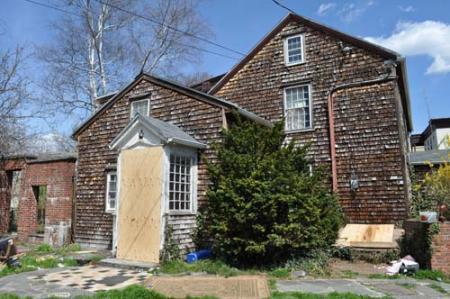October 9, 2014

The Fowler-Clark farm has been boarded up in recent years to prevent further damage from squatters. The farmhouse dates to the 18th century. Reporter file photo
A historic but endangered Mattapan landmark could soon have a new owner that would ensure that it remains viable for decades to come. Historic Boston Inc. has entered into an agreement to purchase the Fowler-Clark farmhouse on Norfolk Street. The transaction will not be executed until next March, giving the non-profit preservation group time to raise funds and create a definitive plan for re-using the property’s old structures for housing.
The farmhouse, which was built at the turn of the 18th century, is one of the city’s last tangible links to a now-distant agrarian past. Designated as historic landmarks in 2006, the house and an adjacent barn have since been boarded up by city inspectors worried that squatters would destroy the buildings through vandalism or fire.
In August 2013, the city of Boston took the unusual step of seizing control of the 30,000- square-foot site from its then owner, the Epstein family estate, triggering a legal battle. The city said it had to step in to prevent the property’s “demolition by neglect.”
Kathy Kottaridis, the executive director of Historic Boston, Inc., says that the group has long hoped to save the Fowler-Clark Farm— and intends to keep the historic structures intact. “Our vision for the site is to restore the two historic structures and maintain the pastoral setting of the farm,” said Kottaridis, who said her organization would like to use the buildings for housing units.
“Even though it needs a lot of TLC, [the farmhouse] has been unoccupied for better part of five years. It is amazing how quickly historic buildings can decline. There are cosmetic and some minor structural issues, but we think it’s a solid building and there are not nearly kind of problems that you see in houses that have gone unoccupied for ten, fifteen years.”
Historic Boston has commissioned a feasibility study to determine whether the assumptions that underpin their plans for the site are on the right track. The six-month waiting period before the sale is executed “recognizes that it will be a very costly project.” The total cost of the sale has not been disclosed. Kottaridis said that the Epstein Family Estate will share in the proceeds of a later sale of the housing that is created in the redevelopment plan. “The estate will stay with us in the project for five years until we sell it. They will benefit from the proceeds,” she said.
The seizure of the property by city’s Department of Neighborhood Development and the estate’s reaction to that move played out out last October in a Boston courtroom. Kottaridis said that the city’s attention to the property was “catalytic for the purposes of creating a dialogue with the estate. They had to pay attention to the question of the fact that it’s a Boston landmark,” she said.
Villages:
Topics:


